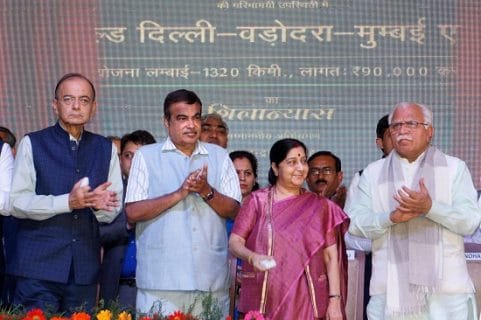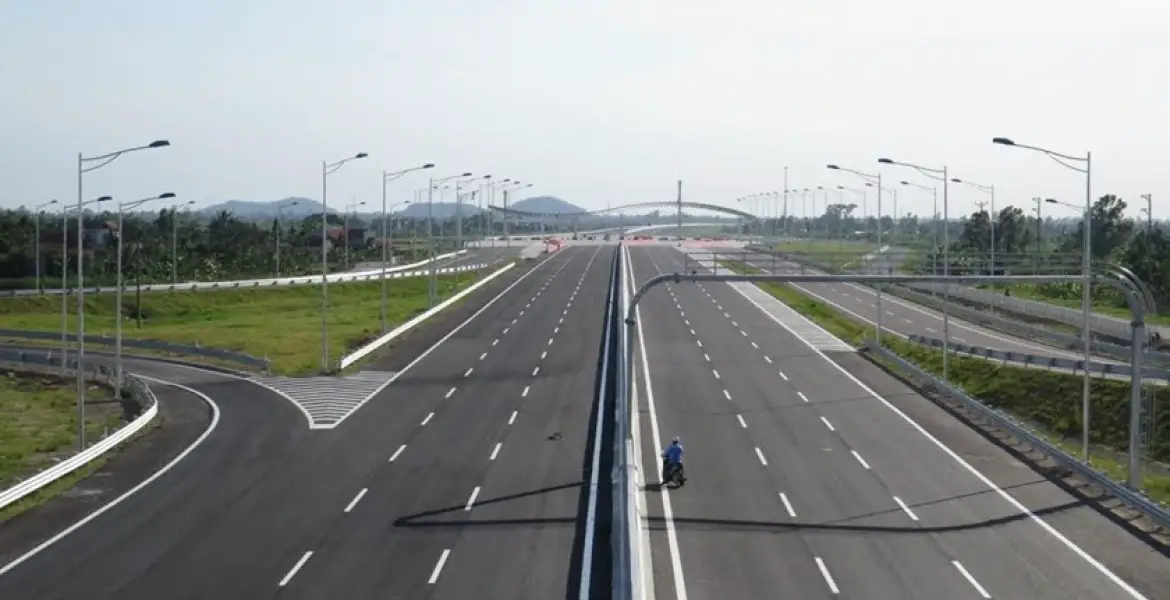The Delhi-Mumbai expressway project is a new expressway link connecting India’s capital, Delhi, with the important commercial centre, Mumbai. The eight-lane expressway, being built under the engineering, procurement and construction (EPC) route, would reduce the distance between the two cities by over 220km and cut travel time to 13 hours from 24 hours now. The US $15.38bn passes through the states of Haryana (80km), Rajasthan (380km), Madhya pradesh (244km), Gujarat (300km) and Maharashtra (120km).
Also Read: Construction of Delhi-Mumbai expressway in full swing
Timeline
2018
All tenders for the project were awarded.
2019
Land acquisition for the 1,250km expressway was complete in Haryana (80km), while it was still ongoing in the partially remaining portions of Rajasthan (380km), Gujarat (300km), Madhya Pradesh (120km) and Maharashtra (370km).
In March, the foundation stone of the project was laid by union ministers Nitin Gadkari, Sushma Swaraj and Arun Jaitley. Construction underway.

2020
July
Construction of Delhi-Mumbai expressway, a new expressway link connecting India’s capital, Delhi, with the important commercial centre, Mumbai is in full swing. Work is being carried out on 18 of the 51 stretches into which the 1,320km expressway has been divided.
Works have already started on a 497km stretch, with another 162km waiting on the horizon after the tender was awarded. A further 569km stretch is currently under the bidding process. The eight-lane expressway, being built under the engineering, procurement and construction (EPC) route, would reduce the distance between the two cities by over 150km and cut travel time to 13 hours from 24 hours now.
Under construction Mumbai Vadodara Expressway has been subsumed in this project. The total cost of the project is expected to be about US $15.38bn. It passes through the states of Haryana (80km), Rajasthan (380 km), Madhya pradesh (370km), Gujarat (300km) and Maharashtra (120km)
Also Read: Kenya in search of a consultancy firm for Nairobi Expressway Project
Delhi-Mumbai expressway
Expected to be ready by 2023-24, the project was necessitated due to the heavy congestion on the Delhi-Mumbai National Corridor along NH-48 of the Golden Quadrilateral. The six-lane corridor, a critical component of the country’s road network, sees an average traffic of around 80,000 passenger car units (PCUs), a figure that is expected to rise to around 100,000 PCUs soon.
In August, Union Minister Nitin Gadkari announced that the section of the expressway that will pass through Madhya Pradesh state will entail an investment of US $1.1m. He added that not only will the project passing through a new alignment develop the tribal areas in the state but also create huge employment opportunities.
In the same month, the National Highways Authority of India (NHAI) formed a special purpose vehicle (SPV) company for financing, construction and operation of the expressway. The SPV which has been registered under the name of ‘DME Development Ltd.’ and will be wholly owned by NHAI shall raise debt on its balance sheet, while NHAI will retain the operational control during construction and operation and maintenance periods. The toll on the projects housed in SPV shall be collected by NHAI and SPV shall get the annuity payments without any construction and tolling risks.
In September, Speaking at the 60th Annual SIAM conference, Road Transport and Highways Minister Nitin Gadkari said that the Delhi-Mumbai Expressway project will be complete by 2022.
In late October, the National Highways Authority of India (NHAI) began soil testing on the Faridabad-Sohna bypass road for accelerating work on the extension of the Delhi-Mumbai expressway to DND Flyway in Delhi. Bores were sunk at two locations in Faridabad near Chandawali Bridge and Sector 37 which are near the proposed interchange without disturbing traffic. A third spot has been identified at Kaili Mod in Ballabhgarh. According to an NHAI official, after the soil testing report is received, work will begin in full swing.
2021
In early January, Union Road and Transport Minister Nitin Gadkari announced that the the Expressway would be extended to the Jawaharlal Nehru Port Trust (JNPT). A network of 75-way side amenities is also planned on either side of the expressways at an interval of 50km. Gadkari also revealed that the cost of the project was also increased by about Rs 5,801 crore.
In early February, NHAI contractor Patel Infrastructure created a world record for laying a maximum of 2.6km four-lane concrete road at one project site in a day, on the Delhi-Mumbai expressway. The feat was recognised by the India Book of Records and Golden Book of World Records.
This is also the first time a 19m single concrete paver was used for road construction, which means this paver can lay the concrete on five lanes at any given time. This will accelerate the expressway construction in India.
In late March, the NHAI announced that its fully owned special purpose vehicle (SPV) DME Developers (DMEL) has raised `9,731 crore to part-fund the 1,276km, greenfield Delhi-Mumbai expressway.
“The major share of the funding came from the largest bank in India, the State Bank of India, which contributed Rs 5,000 crore. Punjab National Bank, Bank of Maharashtra and Axis Bank are the other investors in the SPV,” NHAI said in a statement.
The total estimated cost of the Delhi-Mumbai expressway project is about Rs 87,453 crore, including land acquisition cost of about Rs 20,589 crore.
During the construction period, the total capital expenditure is estimated to be Rs 53,849 crore, which will be funded through a combination of `48,464 crore debt and equity, the remaining.
In mid-July, Road Transport and Highways Minister Nitin Gadkari said that all efforts are being made to complete the Delhi-Mumbai Expressway project expeditiously. According to the minister, out of total length of the project, 350km has already been constructed and works for construction of 825km is in progress. He further added that bids for the remaining 163km length have been received/invited and the balance works are likely to be awarded in the current financial year.
In mid-August, Uttar Pradesh and Haryana governments decided to equally share the cost of building a spur route to connect the airport site in Jewar with the Delhi-Mumbai expressway.
Earlier, arriving at the cost-sharing formula was proving to be difficult since a major portion of the link road falls under Haryana. However, the UP government has committed to share half the total project cost. The road is said to be important as it will boost connectivity in the Yamuna Expressway region.

